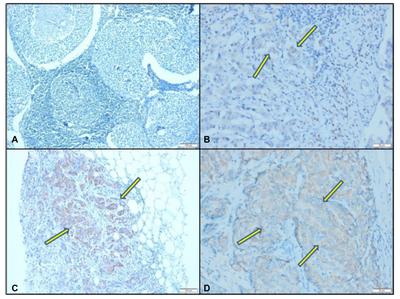A preliminary study on the prognostic significance of cysteine-rich EGF ligand domain 2 protein (CRELD2) in patients with triple negative breast cancer
DOI:
https://doi.org/10.17305/bb.2024.11865Keywords:
Cysteine-rich epidermal growth factor ligand domain 2 protein, CRELD-2, breast cancer, triple negative, survivalAbstract
The cysteine-rich epidermal growth factor ligand domain 2 protein (CRELD2) is associated with pathways that regulate epithelial-to-mesenchymal transition, a critical process driving cancer metastasis. This study aimed to determine the prognostic value of CRELD2 status on survival outcomes in triple-negative breast cancer (TNBC). Seventy patients were included in the study. Thirty-four patients were metastatic, and 36 patients were non-metastatic. CRELD2 protein expression in tumor tissue was determined by immunohistochemical staining (IHC). The patients were divided into two groups: CRELD2 positive and negative groups. Clinicopathological features and survival outcomes were compared between the groups. In the survival analysis of the non-metastatic patient group, five-year overall survival (OS) rate was 91.7% in the CRELD2-positive patient group and 91% in the negative group (P = 0.91). Median progression free survival (PFS) was 9.4 (95% confidence interval [CI]: 6.4–12.4) months in the CRELD2-positive group and 11.9 (95% CI: 8.2–18.6) months in the CRELD2-negative group (P = 0.04). The median OS was 17.2 (95% CI: 13.7–22.3) months in the CRELD2-positive group and 24.7 (95% CI: 21.8–29.6) months in the CRELD2-negative group (P = 0.02). In multivariate analysis, CRELD2 status (negative vs positive) (hazard ratio [HR]: 0.50, 95% CI: 0.38–0.96, P = 0.02) was determined to be a risk factor for OS and CRELD2 status (negative vs positive) (HR: 0.82, 95% CI: 0.33–0.96, P = 0.01) was defined as a risk factor for PFS in patients with metastatic TNBC. This is the first clinical study to determine the effect of CRELD2 on survival and as a prognostic marker in patients with triple metastatic breast cancer. These results need to be validated prospectively with a large sample size.
Citations
Downloads

Downloads
Published
Issue
Section
Categories
License
Copyright (c) 2025 Mehmet Zahid Kocak, Murat Araz, Siddika Findik, Aykut Demirkiran, Mustafa Korkmaz, Melek Karakurt Eryilmaz, Mehmet Artac

This work is licensed under a Creative Commons Attribution 4.0 International License.









